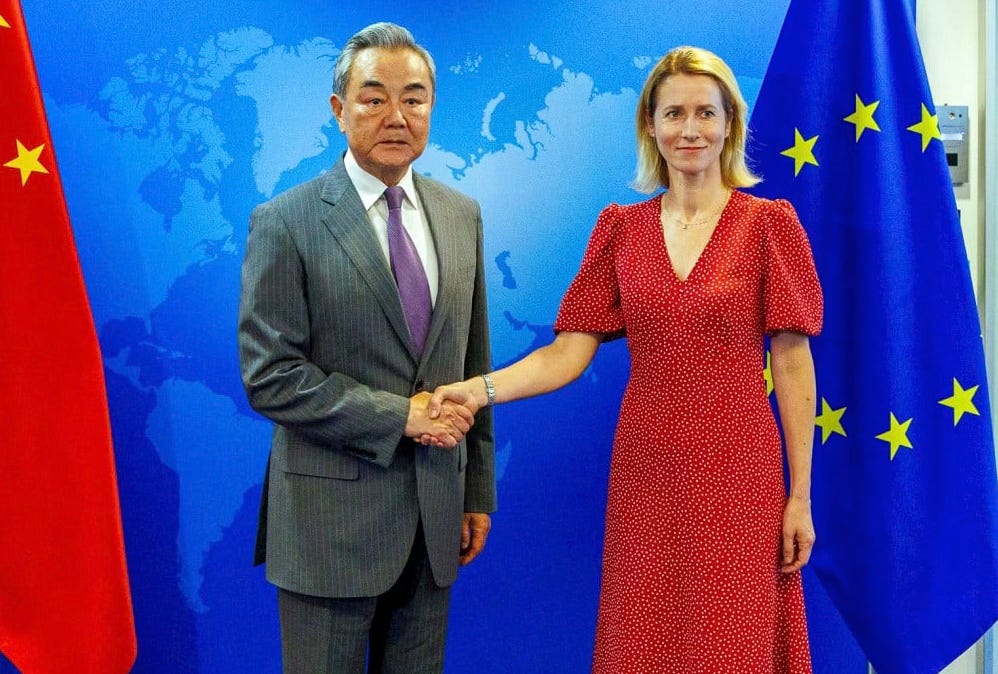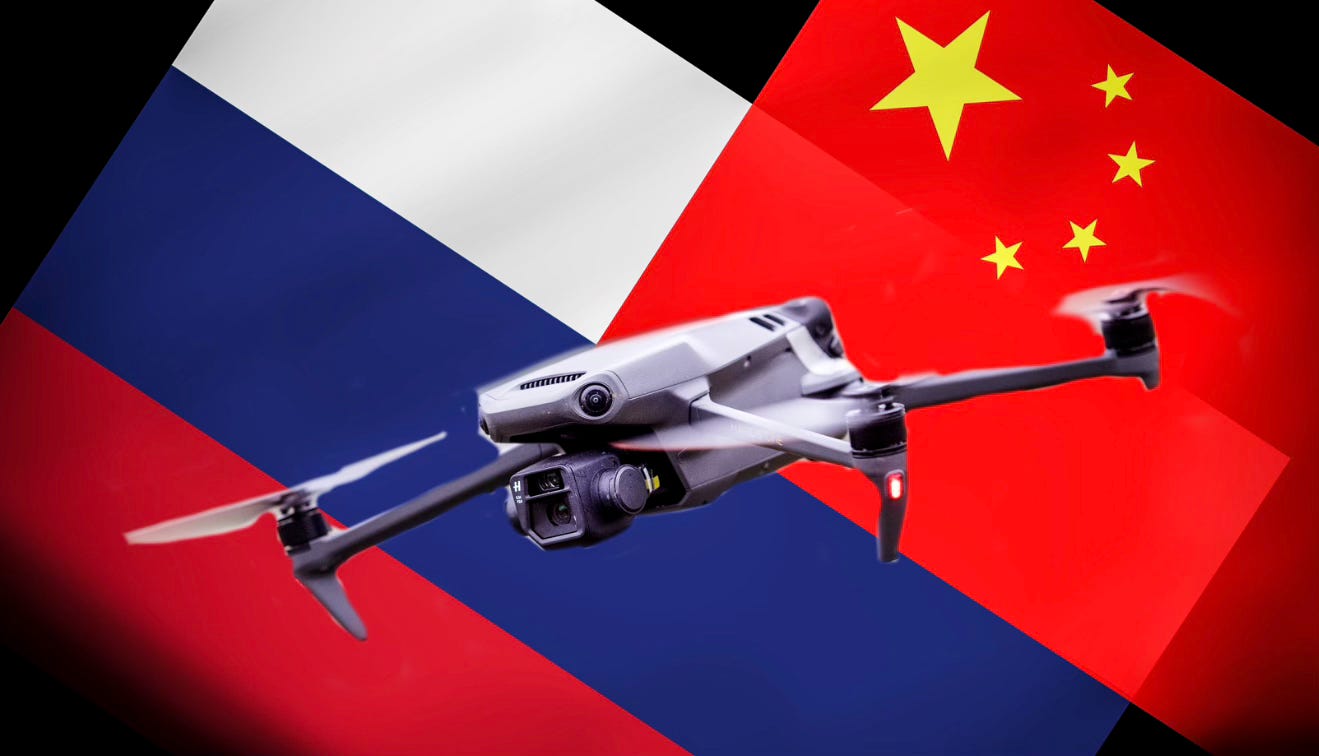Ukraine is a Diversion: China’s Calculated Stake in Prolonging the War
Why Beijing fears the U.S. turning its attention East
Hello and welcome back to States of Play.
For the last three years there has been constant debate in political and media circles as to whether China wants Russia to be fighting in Ukraine or not.
In the wake of the February 2022 invasion, there were those that believed that China was angry that Russia had taken military action only days after Xi and Putin had announced that they had a friendship “with no limits”.
When Russian troops crossed into Ukraine in February 2022, it was said that many in Beijing watched with quiet unease. While China and Russia had drawn steadily closer in recent years, the abrupt and violent nature of the invasion ran counter to China’s carefully managed approach to reshaping the global order. For some in the Chinese leadership, analysts suggest, the war has proved to be more of a strategic liability than an opportunity.

As Russian troops made a hash of the invasion, so the wisdom went, so China grew angry with its neighbour’s rashness.
As the Asia Society published in October 2023:
“Xi Jinping’s undeclared alliance with Vladimir Putin seems to have landed China in a foreign‑policy quagmire… Neither leader anticipated the strength of the Ukrainian resistance, dashing hopes in both Moscow and Beijing of a swift end to the war.”
At the heart of the discomfort lay Beijing’s long-standing reliance on ambiguity and balance. China had sought to court the West economically while positioning itself as a counterweight to American power. Moscow’s actions forced a choice: condemn the invasion and risk fracturing the “no-limits” partnership, or remain silent and face growing mistrust from Europe and the United States. In choosing the latter, Beijing has paid a diplomatic price.
There were also hard economic calculations at stake. The West’s sweeping sanctions regime raised the spectre of secondary sanctions on Chinese firms trading with Russia - an unwelcome prospect for a country still dependent on access to Western markets and technologies. As the global economy reeled from spiking energy and grain prices, Beijing found its supply chains and overseas investments under pressure.
Far from weakening the West, the war in Ukraine has, paradoxically, strengthened it. NATO has expanded, transatlantic ties have deepened, and a once-fractured G7 has found new coherence. For a China that thrives in the spaces between rival powers, the reassertion of Western unity has narrowed its room for manoeuvre.
Perhaps most troubling of all, the invasion has sharpened global attention on Taiwan. Comparisons—however imperfect—have become common currency in diplomatic circles. Military movements in the Taiwan Strait are now viewed through the prism of Ukraine, raising the stakes and limiting Beijing’s ability to proceed quietly or gradually.
In short, so the argument goes, Russia’s war has brought precisely the kind of turbulence China prefers to avoid. While Beijing remains publicly aligned with Moscow, the consequences of the invasion - diplomatic isolation, economic instability, and geopolitical overreach—run counter to the slow, steady recalibration China had been pursuing.
Why China Might Support Russia in Ukraine
The alternative view is that Moscow’s actions are actually a benefit to Beijing.
One argument in this perspective’s favour is that China is tacitly supporting Russia in its “special military operation”, which it wouldn’t necessarily do so if not at least partly behind Moscow.
While stopping short of supplying arms, China has thrown Russia an economic and diplomatic lifeline. It imports record volumes of Russian oil, conducts trade in yuan, and supplies dual-use technologies, including drones. Beijing abstains from UN votes, echoes Kremlin narratives, and courts Moscow through high-level visits. Though cloaked in neutrality, this tacit backing helps insulate Russia from Western pressure - allowing China to quietly benefit from a weakened West without breaching the threshold of open alliance.
This tacit support for Russia’s war in Ukraine is not simply a matter of ideological alignment - it reflects a deeper calculus rooted in Beijing’s long-term strategic priorities. In practice, the invasion has afforded China several significant advantages.
First, continued access to discounted Russian energy and critical minerals has bolstered China’s economic security at a time when Western sanctions have disrupted global supply flows. These resources are indispensable to Beijing’s ambitions in high-tech manufacturing and green energy.
Second, the “no-limits” partnership with Moscow has allowed China to project greater diplomatic weight. By standing beside Russia—even if at arm’s length—Beijing strengthens its credentials as a leader of an emerging multipolar order. Forums like BRICS and the Shanghai Cooperation Organisation offer alternative platforms to the Western-led institutions China increasingly seeks to counterbalance.

Third, China’s alignment with Russia supports its pursuit of trade sovereignty. By deepening economic ties with sanctioned or semi-isolated economies, Beijing reduces its exposure to Western pressure and accelerates the diversification of its global supply chains. In doing so, it lays the groundwork for a more autonomous economic model—less vulnerable to Washington’s leverage and more attuned to Beijing’s vision of a rebalanced global order.
Candid Wang
It seems that there is also a fourth benefit.
In a rare moment of candour, China’s top diplomat has admitted what many in Western capitals have long suspected: Beijing does not want Russia to lose the war in Ukraine. This is a sentiment not simply out of affinity with Moscow, but because it fears what would come next.
As reported in the SCMP, according to sources familiar with a high-level meeting in Brussels last week, Chinese Foreign Minister Wang Yi told the European Union’s chief diplomat, Kaja Kallas, that a Russian defeat would likely result in the United States redirecting its strategic bandwidth to the Pacific theatre. For Beijing, already navigating a precarious standoff with Washington over trade, technology, and Taiwan, such an outcome would be highly undesirable.
The message, delivered behind closed doors but confirmed by multiple officials, is unambiguous: China views the war in Ukraine not only through the lens of geopolitics, but as a vital strategic distraction that keeps the United States - and by extension, NATO - from fully committing to the Indo-Pacific.
This is not the posture China adopts publicly. Beijing continues to assert that it is “not a party” to the Ukraine conflict, and maintains the fiction of strict neutrality. But Wang’s remarks suggest a different calculus behind the scenes: one in which the war’s prolongation serves China’s national interest.
Realpolitik in Brussels
The encounter between Wang and Kallas, the former Estonian prime minister who now serves as the EU’s de facto foreign policy chief, was by all accounts tense and unvarnished. In a four-hour meeting replete with pointed history lectures, Wang reportedly conveyed a sense of urgency about Washington’s shifting strategic focus.
While insisting that China was not materially supporting Russia’s war effort—claiming that if it were, “the conflict would have ended long ago”—Wang made clear that Beijing sees advantage in the current state of geopolitical flux. For now, the United States is devoting vast resources to Kyiv, sending munitions and money, straining its own stockpiles, and weathering political divisions at home. China would prefer that to continue.
“The concern in Beijing,” one senior EU official said, “is not just that Russia might lose. It’s that America might win—and then come east.”
A Dangerous Calculus
China’s strategic fear is that a weakened or defeated Russia would remove one of the few counterweights to U.S. global power, freeing Washington to intensify its focus on the Indo-Pacific. Such a pivot would likely include increased arms sales to Taiwan, further military deployments to the South China Sea, and deeper security cooperation with Japan, South Korea, Australia and the Philippines.
This is not a hypothetical threat. U.S. policy has already been shifting eastward under
Keep reading with a 7-day free trial
Subscribe to States of Play by Sam Olsen to keep reading this post and get 7 days of free access to the full post archives.



